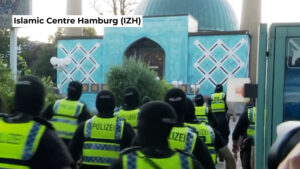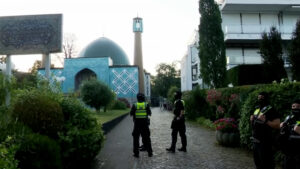INTRODUCTION
Germany has taken a decisive stand against extremism, shutting down the Islamic Center Hamburg (IZH) and associated mosques. This article explores the implications and broader context of these actions.
In a significant move to curb extremism, Germany recently shut down the Islamic Center Hamburg (IZH), including the Blue Mosque. This action, backed by thorough investigations and legal measures, marks a decisive moment in the country’s ongoing efforts to counter radicalism and uphold democratic values. The closures were part of a broader strategy to tackle Islamist extremism, distinguishing between extremist actions and the peaceful practice of Islam. This article delves into the details of this operation, the reasons behind it, and the wider implications for both Germany and Europe.
The Islamic Center Hamburg (IZH) Ban: A Bold Decision
Why Germany Shut Down the Blue Mosque?
The Blue Mosque, a prominent structure in Hamburg, has been a focal point for the Islamic Center Hamburg. However, authorities determined that the IZH was involved in activities opposing Germany’s constitutional order. The organization’s ties to a larger Islamist network raised significant concerns, prompting the government to take action.
The Role of German Security Agencies
German security agencies played a crucial role in monitoring the IZH’s activities. Over the years, they gathered substantial evidence indicating the organization’s involvement in promoting radical ideologies. This culminated in a coordinated raid across several states, including Hamburg, where police confiscated assets and secured necessary evidence.

National and International Impact of the IZH Ban
The ban on the IZH and related organizations has far-reaching implications. It sends a clear message to extremist groups and serves as a model for other countries dealing with similar issues. The operation also demonstrates Germany’s commitment to maintaining public safety and constitutional values.
Legal and Constitutional Justifications for the Ban
The Legal Framework for Banning Extremist Organizations
Germany’s decision to ban the IZH was based on solid legal grounds. The country’s laws provide mechanisms to disband organizations that threaten constitutional order. The ban was carefully planned to ensure it met all legal requirements, thus upholding the rule of law.
Distinguishing Between Extremism and Religion
A crucial aspect of this action was differentiating between extremist activities and the peaceful practice of Islam. Both German officials and Islamic communities emphasized that the ban targeted radicalism, not the religion itself. This distinction is vital in maintaining social harmony and ensuring that law-abiding citizens practicing their faith are not unjustly targeted.

The Role of the Federal Interior Ministry
Federal Interior Minister Nancy Faeser played a pivotal role in the enforcement of this ban. Unlike her predecessors, Faeser took decisive action based on intelligence and legal provisions. Her leadership in this matter underscores the government’s commitment to tackling extremism.
The Broader Context of Germany’s Fight Against Extremism
Germany’s Strategy Against Radical Islamism
Germany’s strategy against radical Islamism involves a comprehensive approach, including monitoring, legal actions, and community engagement. The IZH ban is part of a broader crackdown on Islamist extremism, reflecting a proactive stance in protecting democratic values.
The Importance of Community Relations
Maintaining positive relations with Muslim communities is a key element of Germany’s strategy. The government has worked closely with community leaders to ensure that measures against extremism do not alienate peaceful practitioners of Islam. This approach helps prevent the stigmatization of the broader Muslim population.

Previous Actions Against Extremist Groups
Germany has a history of taking action against extremist groups. The country has banned several organizations and deported individuals found to be involved in anti-constitutional activities. These actions are part of a long-term strategy to safeguard national security and uphold democratic principles.
The Role of the Islamic Center Hamburg in Extremism
The IZH’s Connection to Radical Networks
Investigations revealed that the IZH was part of an extensive Islamist network with ties to Iran. This network was found to be promoting ideologies contrary to Germany’s democratic values. The ban aims to disrupt these connections and prevent further radicalization.
Actions Taken by Hamburg’s Authorities
Hamburg’s authorities have been vigilant in monitoring the IZH. They previously removed the organization from the council of Islamic communities in the city and conducted thorough investigations. These actions laid the groundwork for the eventual ban.

The Impact on Local and National Security
The closure of the IZH and associated mosques has significant implications for security. It removes a potential hub for extremist activities and sends a strong message that Germany will not tolerate actions that threaten its constitutional order.
The Federal Ministry of the Interior’s Response
Minister Nancy Faeser’s Statement
Interior Minister Nancy Faeser emphasized the distinction between Islam and Islamist extremism. She clarified that the government’s actions were directed solely against radical elements that pose a threat to public safety and democracy. Her statements were aimed at reassuring the broader Muslim community in Germany.
The Role of Federal and State Coordination
The operation against the IZH was a coordinated effort involving federal and state authorities. This collaboration ensured that the action was comprehensive and legally sound, minimizing the risk of backlash or legal challenges.

Future Plans for Monitoring and Enforcement
Germany plans to continue monitoring extremist activities and enforcing laws against organizations that threaten public safety. The government is committed to using all available legal tools to protect its citizens and uphold democratic values.
The Impact on Hamburg’s Muslim Community
Reactions from Local Islamic Organizations
Local Islamic organizations in Hamburg and across Germany have expressed support for the government’s actions against extremism. They emphasize that the measures do not target Islam but are necessary to safeguard the community from radical elements.
Ensuring Freedom of Religion
The German government has reiterated its commitment to religious freedom. The actions against the IZH are not an attack on Islam but a necessary step to protect the constitutional order. This distinction is crucial in maintaining the country’s multicultural and diverse society.

Building Trust and Cooperation
Building trust and cooperation between authorities and Muslim communities is essential. The government continues to engage with community leaders to ensure that measures against extremism do not harm the peaceful practice of Islam.
The International Perspective on Germany’s Actions
Reactions from Other European Countries
Germany’s decisive action against the IZH has attracted attention from other European countries. Some nations are considering similar measures to tackle extremism within their borders. Germany’s approach could serve as a model for these countries.
Iran’s Response to the Ban
Iran reacted strongly to the ban, summoning the German ambassador and condemning the action as Islamophobic. However, Germany maintains that the measures are necessary for national security and are not an attack on the religion of Islam.

The Role of International Cooperation
International cooperation is crucial in combating extremism. Germany’s actions highlight the need for a unified approach in Europe to address these challenges effectively.
Broader Implications for European Immigration Policies
The Connection Between Extremism and Immigration
The crackdown on the IZH also reflects broader concerns about extremism and immigration. Germany and other European countries are reexamining their immigration policies to ensure they balance humanitarian concerns with national security.
Germany’s Shift in Immigration Policy
Germany has recently made significant changes to its immigration policies. The country is tightening controls and reassessing asylum claims, particularly from conflict zones like Syria. These changes reflect a broader trend towards more stringent immigration measures.

The Impact on Syrian Asylum Seekers
A landmark court ruling in Germany found that not all Syrians are at risk of persecution, affecting asylum seekers from the region. This ruling marks a shift in Germany’s approach to handling asylum claims and has broader implications for European immigration policies.
Europe’s Broader Shift in Immigration Policies
Poland’s Strict Immigration Stance
Poland has taken a notably strict stance on immigration, with measures to control its borders and prevent illegal migration. The country’s policies have been cited as a model for other European nations.
The Netherlands’ New Asylum Regulations
The Netherlands is also implementing stricter asylum regulations under a new government. These changes are part of a broader European trend towards tightening immigration controls.
The Role of European Union Cooperation
The European Union plays a critical role in coordinating immigration policies among member states. Germany’s recent actions and the broader European trend towards stricter policies highlight the need for EU-wide cooperation.

Conclusion: The Future of Germany’s Fight Against Extremism and Immigration Challenges
Germany’s decisive actions against the IZH and its broader approach to extremism and immigration reflect a commitment to safeguarding its constitutional values and public safety. The country continues to differentiate between combating radicalism and protecting the rights of peaceful religious practitioners. As Europe faces increasing challenges from extremism and uncontrolled immigration, Germany’s approach offers a potential model for other nations. The balance between security and humanitarian concerns remains a key challenge, requiring ongoing vigilance and cooperation both domestically and internationally.
For a more comprehensive understanding of the recent events and insights from key figures, watch our full video on YouTube. Click here to view the video and join the conversation by leaving your comments and thoughts.

FAQs
What is the Islamic Center Hamburg (IZH)? The Islamic Center Hamburg (IZH) was a religious organization associated with the Blue Mosque in Hamburg. It was recently banned by German authorities due to its involvement in activities opposing the country’s constitutional order.
Why did Germany shut down the Blue Mosque? The Blue Mosque was closed as part of a broader crackdown on the IZH, which was found to be part of an extensive Islamist network promoting radical ideologies. The closure aimed to disrupt these activities and uphold democratic values.
How did the German government differentiate between Islam and extremism? German authorities emphasized that their actions were targeted solely at extremist elements and not at the peaceful practice of Islam. The distinction is crucial in maintaining social harmony and protecting the rights of law-abiding citizens.
What are the broader implications of the IZH ban for Europe? The ban on the IZH has implications beyond Germany, as it sets a precedent for other European countries grappling with similar challenges. It highlights the importance of a coordinated approach to tackling extremism and safeguarding national security.
How is Germany’s immigration policy changing? Germany is tightening its immigration policies, particularly regarding asylum seekers from conflict zones like Syria. Recent court rulings have influenced these changes, reflecting a broader trend towards more stringent controls.
How has Iran reacted to the IZH ban? Iran condemned the ban on the IZH, viewing it as an act of Islamophobia. However, Germany maintains that the action was necessary for national security and was not an attack on Islam as a religion.
